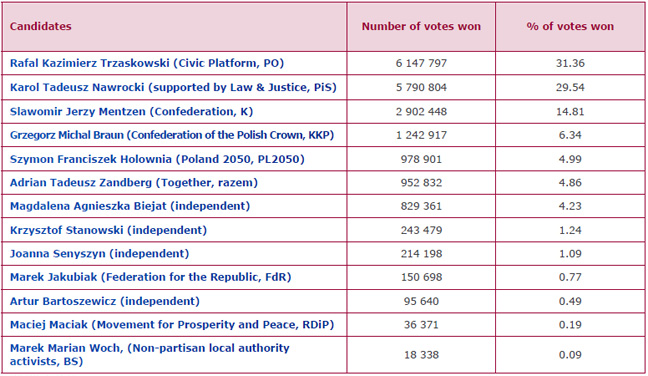Results
Elections in Europe
Corinne Deloy
-

Available versions :
EN

Corinne Deloy
Rafal Kazimierz Trzaskowski (Civic Platform, PO) came out ahead in the first round of the presidential election on 18 May. The mayor of Warsaw and former Minister of Civil Administration and Digital Affairs (2013-2014) won 31.36% of the vote, ahead of his opponent Karol Tadeusz Nawrocki, current director of the Institute of National Remembrance (IPN) responsible for prosecuting Nazi and Soviet crimes against Poles, who was supported by the main opposition party, Law and Justice (PiS), which won 29.54% of the vote.
The two men will therefore face each other in the second round on 1st June.
Slawomir Jerzy Mentzen, candidate for Confederation (K), a far-right alliance that includes his party, New Hope (NN) and the National Movement (RN), the ultra-nationalist party of Krzysztof Bosak, came in third with 14.81%. Finally, Grzegorz Michal Braun, president of the monarchist Polish Crown Confederation (KKP) party, which is openly anti-Semitic and pro-Russian, won 6.34% of the vote.
The nine other candidates each obtained less than 5% of the vote.
Turnout was 67.31%, slightly higher than in the first round of the previous presidential election on 28 June 2020 (+2.8 points).
City dwellers voted mainly for the mayor of Warsaw and left-wing candidates, while those living in rural areas tended to vote for candidates from the PIS and the far right.
Results of the first round of the presidential election in Poland on 18 May 2025
Turnout: 67.31%

Source : https://wybory.gov.pl/prezydent2025/pl/wynik/pl
The results contradicted opinion polls, which is common in Polish presidential elections, where surprises are often the order of the day. The gap between the two leading candidates is much narrower than expected. Furthermore, Slawomir Jerzy Mentzen's result is higher than predicted. The other real surprise was the result achieved by Grzegorz Michal Braun. Together, the two men won 21.15% of the vote. Most of their votes are likely to go to Karol Tadeusz Nawrocki in the second round, which would be a significant boost for the PiS candidate.
Karol Tadeusz Nawrocki has called on his compatriots to vote him into power to prevent the coalition government led by Donald Tusk from ‘monopolising’ power in Poland. ‘With Karol Tadeusz Nawrocki, the government will effectively be paralysed, which could ultimately lead to the collapse of the ruling coalition,’ said political scientist Anna Materska-Sosnowska, adding, ‘His success in the presidential election would in fact mean the return of the populists, with ten times the strength, in two years at the latest,’ i.e. in the next parliamentary elections, she added.
"The game is just beginning. It will be a fierce battle for every vote. These two weeks will decide the future of our homeland. That is why we must not back down, not even one step,” said Prime Minister Donald Tusk when the results were announced.
Szymon Franciszek Holownia, president of the centrist Poland 2050 (PL2050) party, called for a vote in favour of the mayor of Warsaw. He is likely to be followed by independent candidate Magdalena Agnieszka Biejat, who was supported by the Left Alliance (L), which includes the New Left (NL), the Socialist Party (PPS) and the Labour Union (UP). Left-wing politician Adrian Zandberg, whose party Razem (meaning Together) was initially part of Donald Tusk's parliamentary coalition before leaving it, has refused to give any voting instructions. However, most of his voters are expected to back Rafal Kazimierz Trzaskowski.
A victory for Rafal Kazimierz Trzaskowski on 1st June would allow the government to honour its campaign promises. Some of the commitments made by Donald Tusk during his election campaign on 15th October 2023 are effectively being blocked due to a difficult relationship with the outgoing President of the Republic, Andrzej Duda.
The Polish president has the right to veto any bill, which can only be overturned by a three-fifths majority in a vote attended by at least half of the members of parliament. The current government majority does not have enough votes to achieve this majority and override a presidential veto.
Andrzej Duda (PiS) has vetoed four laws (including one giving free access to the morning-after pill and another recognising Silesian as one of the country's minority languages). He has referred four other laws to the Constitutional Court, preventing them from coming into force until their compliance with the constitution has been verified. He has also blocked several administrative appointments that cannot be confirmed without his approval.
Rafal Kazimierz Trzaskowski wants to lift the veto blocking the judicial reform sought by Donald Tusk's government. He has promised to liberalise abortion laws, support renewable energy and launch a long-term plan for the adoption of the single currency. The latter issue has almost completely disappeared from public debate in Poland. By putting it on the agenda, Rafal Kazimierz Trzaskowski wants to put Europe at the heart of Polish politics. ‘Today, we can finish what we started in 2023 (...) I guarantee you a law that will abolish the medieval anti-abortion law, I promise you a law that will abolish all the flaws in the judicial system so that it becomes more efficient. I guarantee you the separation of church and state (...) It is a choice between stability and chaos, between freedom and indoctrination, between honesty and deception,’ he said when the results were announced.
However, the second round is shaping up to be very close. The next two weeks will be decisive. A new campaign is beginning.
On the same theme
To go further
Elections in Europe
Helen Levy
—
24 February 2026
Elections in Europe
Helen Levy
—
10 February 2026
Elections in Europe
Corinne Deloy
—
20 January 2026
Elections in Europe
Corinne Deloy
—
13 January 2026

The Letter
Schuman
European news of the week
Unique in its genre, with its 200,000 subscribers and its editions in 6 languages (French, English, German, Spanish, Polish and Ukrainian), it has brought to you, for 15 years, a summary of European news, more needed now than ever
Versions :


